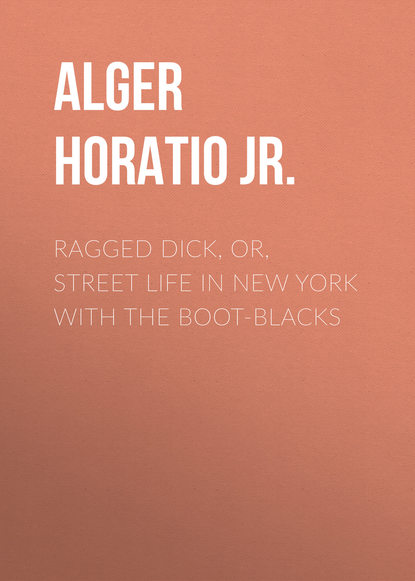По всем вопросам обращайтесь на: info@litportal.ru
(©) 2003-2024.
✖
Ragged Dick, Or, Street Life in New York with the Boot-Blacks
Настройки чтения
Размер шрифта
Высота строк
Поля
"Up to Mr. Taylor's, on Spruce Street, to see if he don't want a shine."
"Do you work for him reg'lar?"
"Yes. Him and his partner wants a shine most every day. Where are you goin'?"
"Down front of the Astor House. I guess I'll find some customers there."
At this moment Johnny started, and, dodging into an entry way, hid behind the door, considerably to Dick's surprise.
"What's the matter now?" asked our hero.
"Has he gone?" asked Johnny, his voice betraying anxiety.
"Who gone, I'd like to know?"
"That man in the brown coat."
"What of him. You aint scared of him, are you?"
"Yes, he got me a place once."
"Where?"
"Ever so far off."
"What if he did?"
"I ran away."
"Didn't you like it?"
"No, I had to get up too early. It was on a farm, and I had to get up at five to take care of the cows. I like New York best."
"Didn't they give you enough to eat?"
"Oh, yes, plenty."
"And you had a good bed?"
"Yes."
"Then you'd better have stayed. You don't get either of them here.
Where'd you sleep last night?"
"Up an alley in an old wagon."
"You had a better bed than that in the country, didn't you?"
"Yes, it was as soft as—as cotton."
Johnny had once slept on a bale of cotton, the recollection supplying him with a comparison.
"Why didn't you stay?"
"I felt lonely," said Johnny.
Johnny could not exactly explain his feelings, but it is often the case that the young vagabond of the streets, though his food is uncertain, and his bed may be any old wagon or barrel that he is lucky enough to find unoccupied when night sets in, gets so attached to his precarious but independent mode of life, that he feels discontented in any other. He is accustomed to the noise and bustle and ever-varied life of the streets, and in the quiet scenes of the country misses the excitement in the midst of which he has always dwelt.
Johnny had but one tie to bind him to the city. He had a father living, but he might as well have been without one. Mr. Nolan was a confirmed drunkard, and spent the greater part of his wages for liquor. His potations made him ugly, and inflamed a temper never very sweet, working him up sometimes to such a pitch of rage that Johnny's life was in danger. Some months before, he had thrown a flat-iron at his son's head with such terrific force that unless Johnny had dodged he would not have lived long enough to obtain a place in our story. He fled the house, and from that time had not dared to re-enter it. Somebody had given him a brush and box of blacking, and he had set up in business on his own account. But he had not energy enough to succeed, as has already been stated, and I am afraid the poor boy had met with many hardships, and suffered more than once from cold and hunger. Dick had befriended him more than once, and often given him a breakfast or dinner, as the case might be.
"How'd you get away?" asked Dick, with some curiosity. "Did you walk?"
"No, I rode on the cars."
"Where'd you get your money? I hope you didn't steal it."
"I didn't have none."
"What did you do, then?"
"I got up about three o'clock, and walked to Albany."
"Where's that?" asked Dick, whose ideas on the subject of geography were rather vague.
"Up the river."
"How far?"
"About a thousand miles," said Johnny, whose conceptions of distance were equally vague.
"Go ahead. What did you do then?"
"I hid on top of a freight car, and came all the way without their seeing me.[1 - A fact.] That man in the brown coat was the man that got me the place, and I'm afraid he'd want to send me back."
"Well," said Dick, reflectively, "I dunno as I'd like to live in the country. I couldn't go to Tony Pastor's or the Old Bowery. There wouldn't be no place to spend my evenings. But I say, it's tough in winter, Johnny, 'specially when your overcoat's at the tailor's, an' likely to stay there."
"That's so, Dick. But I must be goin', or Mr. Taylor'll get somebody else to shine his boots."
Johnny walked back to Nassau Street, while Dick kept on his way to Broadway.
"That boy," soliloquized Dick, as Johnny took his departure, "aint got no ambition. I'll bet he won't get five shines to-day. I'm glad I aint like him. I couldn't go to the theatre, nor buy no cigars, nor get half as much as I wanted to eat.—Shine yer boots, sir?"
Dick always had an eye to business, and this remark was addressed to a young man, dressed in a stylish manner, who was swinging a jaunty cane.
"I've had my boots blacked once already this morning, but this confounded mud has spoiled the shine."
"I'll make 'em all right, sir, in a minute."











